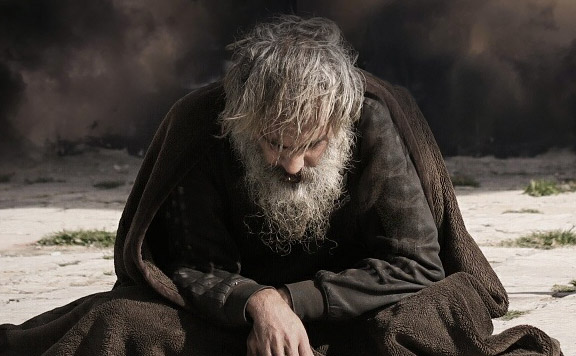I’ve struggled with anxiety in different ways all through my life. The most significant and obvious episode was a series of panic attacks and hospitalisation in my late twenties in the months leading up to the birth of my first child. It also manifested itself in a period of burnout that saw me leave my job in pastoral ministry for a time. As it turns out, I’m not alone. The incidence of anxiety in our community and in our churches is growing.
What Does The Bible Have To Say?
And for Christians who struggle with anxiety, that’s a big problem because we all know what the Bible has to say. “Do not be anxious about anything, but in everything, by prayer and petition, with thanksgiving, present your requests to God” (Phil 4:6). If you’re someone who struggles with anxiety, here’s a command from God that you’re sure you’re disobeying. So the question I want to ask is: Does God have anything else to say about anxiety?
The short answer is: Yes he does! And it’s good news. The longer answer involves understanding the purpose and place of anxiety in God’s world.
To understand that place and purpose, we can begin by noticing that the New Testament has one main word for anxiety: merimnao (don’t worry if you can’t pronounce it, most Bible college students struggle with it as well). However, that word isn’t always translated using the same word in our English Bibles. Sometimes it’s translated with words like worry or anxiety (e.g. Phil 4:6, Matt 6:25). But other times it is translated as concern (e.g. 1Cor 12:24-25, Phil 2:19-20, 2Cor 11:28). What’s interesting is that in this second set of uses, the word isn’t negative, it’s positive. Christians are to be concerned (anxious!) for the welfare and Christian growth of other believers. Sometimes God wants us to be anxious!
Sometimes God wants us to be anxious.
This is a such an important starting point. We tend to speak about anxiety as a negative thing, but the Bible can speak about it as a positive thing. Anxiety is not always sinful, sometimes it is a right response to living in a broken world.
The Bigger Picture: Anxiety In a Fallen World
Which leads us to the bigger picture. When you think about anxiety for a moment, you realise that it’s not something that was needed in the world before the fall—when we walked with God in the cool of the day—nor will it be needed in the New Heavens and the New Earth—when Jesus removes all mourning, death, crying and pain. But in God’s plan, anxiety does have a helpful part to play in this world now. I would go as far as to say that anxiety is a good, God-given gift because in our sin-scarred world sometimes anxiety is a right emotion. There are things to fear. Dogs bite. People hurt each other. Death is terrible. And we love people and want what is best for them, but we can’t control the future. Anxiety has its place.
However, while anxiety is sometimes good and right, like everything else we experience, anxiety can be twisted by sin and bring terrible results. I may become more anxious about what other people think of me than what God thinks of me. I may become more anxious about things like food, drink and clothing than about God’s kingdom and his righteousness.
So what is anxiety? It is God’s good gift for a fallen world. It is a reminder that I live in a broken place where things are dangerous. Anxiety often protects us from things that we need to be protected from. But like all things, it is sometimes an expression of our sinfulness. We can lose perspective and become anxious about things that draw us away from God. What does all of this mean for the person who struggles with anxiety?
I would go as far as to say that anxiety is a good, God-given gift because in our sin-scarred world sometimes anxiety is a right emotion.
What About Christians Who Suffer from Anxiety?
This is where things become a bit tricky for Christians. Because it’s difficult to differentiate between the anxiety that is a result of the fallenness of the world and the unhealthy anxiety that is a part of my sinful response to this broken world. Am I feeling anxious because I have a body that chemically over-reacts to threats, or am I feeling anxious because I have let sin take control?That’s not always an easy question to answer. But once I understand that both things can be true, it creates a helpful perspective from which to take responsibility for something that we can’t fully control.
Am I feeling anxious because I have a body that chemically over-reacts to threats, or am I feeling anxious because I have let sin take control?
This means understanding that anxiety happens at two levels and taking responsibility at both of these levels.
Anxiety is in part a bodily, chemical reality that we are not in complete control of. But that doesn’t mean we take no responsibility. Regular exercise, improved diet and good sleep are all helpful. Of course, doing better at each of these things won’t fix the problem completely or immediately. I could start exercising regularly today and it might be months before I start to notice an effect. So part of taking-responsibility-for-something-I-can’t-control is choosing to work on things that will cause some changes and take some time to work. (This will include accepting God’s gracious provision of medication for some). This is hard work and is something that wise brothers and sisters in Christ can really help with.
But of course, the second reality for anxiety sufferers is that while our anxiety is bodily, it’s not true to say that our anxiety is completely free from sin! Just like all other people, we need the gospel to address our anxiety. And we need the gospel to address our anxieties at many different levels.
How The Gospel of Grace Helps Our Anxiety
At the primary level, we need to remember that our relationship with God is not dependent on our performance but on God’s grace to us in Christ. And I think that the Bible’s teaching on adoption is extremely important here. When God sets his Spirit on us through faith in Christ, we are adopted into his family. Adopted children don’t move in and out of the family depending on whether they have had a more obedient day. They are part of the family. And that is such a precious truth. Through Christ, we stand in a place of grace with God who treats us tenderly.
Thus when the anxiety comes, my first reaction doesn’t need to be “There is sin and I need to stamp it out” but rather, “it’s so hard some days living in this fallen body but God loves me and knows me and graciously holds me in Jesus”.
A great danger for anxious people is that even the gospel can become a law. It goes something like this: I feel anxious today, but I know God doesn’t want me to be anxious, so now I feel guilty about that. But of course, if I really understood the gospel, I wouldn’t feel guilty, so now I feel guilty for feeling guilty! (There are endless unhelpful chains of logic to follow). As we learn to apply the gospel to our anxiety we need to keep remembering that we stand in a place of grace in our relationship with God and that God is for us, not standing against us waiting to get us into trouble.
It is having this understanding of the place of grace in which we stand, that then enables us to wrestle with the ways that sin can be involved in our anxiety. One example for me was learning that my fear of conflict is driven by a fear of people that is greater than my fear of God. By God’s grace, I am learning that the tightness in my stomach when I detect the possibility of conflict is not a sign that I should run away but that I need to express what I’m thinking graciously and respectfully.
Knowing that Jesus is my king and my saviour has challenged and encouraged me to face some of the ways that my anxiety is driven by my sinfulness and to begin to tackle that anxiety in a less anxious way.
Realistic Expectations
The reality is that over the course of my life, I’ve learned that I will probably always wrestle with anxiety in certain situations. It’s something that’s not in my control. But through God helping me to take responsibility for myself (by applying the gospel wisely and learning to face my own sinfulness, as well as taking care of some of the basics of exercise and diet) I have in God’s grace become a little less anxious and a little more able to rest in God’s kindness as I long for that day when I will see Jesus face to face and all of my anxiety will be carried away. What a day that will be!
The post Don’t Be Anxious About Anything! first appeared on the Moore College Think Tank Blog.
Photo: Dorothea Lang, 1938










